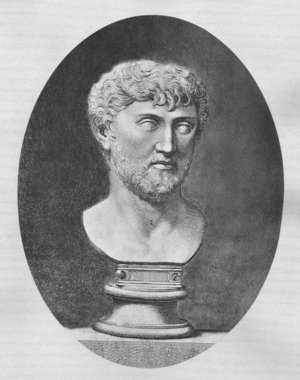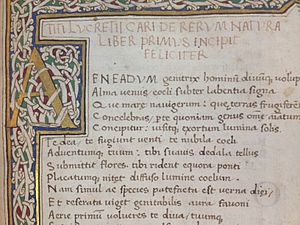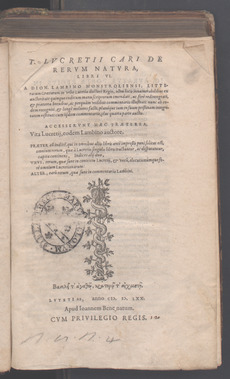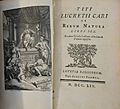Lucretius facts for kids
Quick facts for kids
Titus Lucretius Carus
|
|
|---|---|

Bust of Lucretius
|
|
| Born | c. 99 BC |
| Died | c. 55 BC (aged around 44) |
| Era | Hellenistic philosophy |
| School | Epicureanism Atomism Materialism |
|
Main interests
|
Ethics, metaphysics, atomic theory |
|
Influenced
|
|
Titus Lucretius Carus (/ˈtaɪtəs luːˈkriːʃəs/ TY-təs-_-loo-KREE-shəs, Latin: [ˈtɪ.tʊz lʊˈkreː.tɪ.ʊs ˈkaː.rʊs]; c. 99 – c. 55 BC) was an ancient Roman poet and philosopher. He is famous for his only known work, a long poem called De rerum natura. This title means On the Nature of Things or On the Nature of the Universe.
Lucretius's poem explains the ideas of Epicureanism, a type of philosophy. It talks about how the world works, including the idea that everything is made of tiny particles called atoms. Lucretius is also known for suggesting the idea of the three-age system. This system describes how humans used different materials over time, from stone to bronze to iron.
Very little is known about Lucretius's life. We know that his poem was written for a friend or supporter named Gaius Memmius. Lucretius's work had a big impact on later Roman poets like Virgil. His poem was almost lost during the Middle Ages but was found again in 1417. This discovery helped bring back ideas about atoms and influenced thinkers during the Age of Enlightenment.
Contents
About Lucretius's Life
Not much is known for sure about Lucretius. Historians believe he was born around 99 BC and died around 55 BC. This means he lived during a time of political trouble in Rome.
Lucretius likely came from a wealthy Roman family, the gens Lucretia. His writings show that he knew a lot about the rich lifestyle in Rome. He was also very well educated, learning Latin, Greek, literature, and philosophy. His love for the countryside suggests he might have lived on family estates outside the city.
His Famous Poem: De rerum natura
Lucretius's main work is his poem De rerum natura. It teaches about Epicureanism, which includes ideas about atomism (everything is made of tiny particles) and cosmology (the study of the universe). Lucretius was the first writer to introduce these Epicurean ideas to Roman readers.
The poem is very long, with about 7,400 lines. It is divided into six books. In the poem, Lucretius uses beautiful language and metaphors to explain complex ideas. He talks about the rules of atomism, what the mind and soul are, how we sense and think, and how the world and its natural events developed.
A key idea in the poem is that the universe works based on physical rules and chance, not because of gods. This was a new way of thinking for many Romans at the time.
Human Development in the Poem
In De rerum natura, Lucretius also writes about how humans developed over time. He describes how people first used their hands, nails, and teeth as tools. Then they learned to use stones, branches, and fire.
He explains that people later discovered how to use metals. First, they used copper (or bronze, which is an alloy of copper and tin). Copper was used for farming tools and weapons. Later, iron became more common for swords and plows. Lucretius thought that discovering metal smelting (melting metal) might have happened by accident, perhaps from a forest fire.
Lucretius was one of the first to suggest that human history could be divided into stages based on the materials used. He described a progression from stone and wood, then to copper and bronze, and finally to iron. This idea was later developed into the three-age system in the 1800s by C. J. Thomsen.
Lucretius's Ideas on Nature
Lucretius was an early thinker about how living things change over time, which is now called evolution. He believed that nature constantly tries out new things over long periods. The living things that fit best with their environment are the ones most likely to survive. This means that an animal's strength, speed, or intelligence helped it survive in its surroundings.
Before Charles Darwin published On the Origin of Species in 1859, Lucretius's ideas were an important way of thinking about how life began and changed without needing a divine plan. He did not believe that new species came from older ones, or that land animals came from sea creatures.
Lucretius also questioned if humans were truly better than animals. He pointed out that animal mothers in the wild care for their babies just like human mothers do.
See also
 In Spanish: Lucrecio para niños
In Spanish: Lucrecio para niños
- The Swerve: How the World Became Modern, a book by Stephen Greenblatt
- List of English translations of De rerum natura
Images for kids
 | William M. Jackson |
 | Juan E. Gilbert |
 | Neil deGrasse Tyson |







